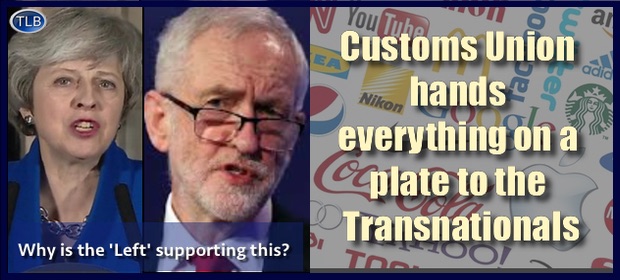
AMBROSE EVANS-PRITCHARD
So we lurch towards a permanent customs union and British infeudation as a non-voting member of the EU legal and regulatory system. This can end only in acrimony and years of bitter conflict with Europe.
Sooner or later an explosive issue will arise. It will become clear why a G7 industrial democracy with 65 million people cannot subcontract swaths of policy-making to a foreign power. The constitutional arrangement is not viable. It guarantees an abrogation crisis down the road.
For good measure we are now more likely to get a radical-Left government as well, one with anti-globalist reflexes, confiscatory tax and anti-wealth policies, and possibly capital controls.
Personally I wanted some form of national government or joint Brexit council three years ago in the different circumstances of June 2016, before the well had been irreversibly poisoned. For Theresa May to do so now as a supplicant without a party behind her is fatal.
Her decision to defy the cabinet and expedite Brexit with Labour votes bestows legitimacy on a Labour leadership that has acted with shocking opportunism. It casts Jeremy Corbyn in the role of national saviour. It validates the media and global narrative of Tory obscurantism.
Whatever political price Mr Corbyn may pay among Northern Leavers for breaching his Manifesto, it will be more than offset by the repudiation of Toryism by the Conservative grass-roots. As Nigel Farage wrote in this newspaper, he will tear the Conservative Party limb from limb.
Currency markets have not yet turned their attention to this prospect. Goldman Sachs is for now doubling-down on its sterling positions, trading the diminished tail-risk of an immediate no-deal Brexit.
You can argue that the Withdrawal Agreement is itself tantamount to the customs union. It locks the UK into a ‘customs territory’ through the Irish backstop, and the EU holds the release key.
EU negotiator Sabine Weyand, told ambassadors behind closed doors that it “requires the customs union as the basis of the future relationship” and that the EU will “retain all the controls.”
At every stage of Brexit talks it has been the EU’s central objective to shoehorn Britain into the customs union and therefore into legal alignment. This prevents the UK from pursuing alternative economic policies. It protects Europe’s manufacturing supply chains and the EU’s £95bn trade surplus in goods.
Brussels offers nothing in return for services – 80pc of the British economy, and 44pc of total exports – where this country has a competitive advantage and a surplus that helps to offset the imbalance. Britain is the second largest exporter of services in the world. This was traded away lightly by the Cabinet Office in the interests of the foreign-owned car industry.
The EU has refused the principle of mutual recognition for services. We must make do with the thin gruel of equivalence. The asymmetry is striking.
Yet the Withdrawal Agreement does not entirely preclude the option of a Canada-style free trade deal in the future. The legal clarifications secured by the Attorney General make it harder for the EU to close the trap of the Irish backstop.
A paper by three eurosceptic professors for Policy Exchange – Guglielmo Verdirame, Richard Ekins, and Sir Stephen Laws – argues that the risk has “receded significantly”. It would be a manifest breach of “good faith” for the EU to dismiss all new solutions to the Irish border out of hand. The UK could appeal to arbitration under international law.
Jean-Claude Piris, ex-head of EU Legal Services, says the beefed up documents have a “legally-binding character” and open the way for Britain “to suspend its obligations” in extremis.
To embrace a customs union in toto is to turn possible entrapment into certain entrapment. Some trade experts tell us with a straight face that Britain can still pursue a sovereign trade policy and do deals with the rest of the world. This is an empty truism. The US will walk away if we must maintain EU legal alignment.
We can knock on doors and seek a deal for services but this is a forlorn quest if we cannot offer access to our goods market as part of the package. Prof Alan Winters from the UK Trade Policy Observatory at Sussex University says no country has ever succeeded in negotiating a comprehensive free trade accord for services in isolation.
The customs union does not alone resolve the Irish border since most checks relate to phytosanitary standards and technical barriers (TBT). Nor does it achieve frictionless trade. Labour has latched on to a chimera.
Companies still have to fill out ATR certificates. This is less onerous than rules of origin forms proving where goods came from – necessary outside the customs union – but the gap is diminishing fast with digital technology already in use in East Asia.
For this mess of potage, the UK must accept profound restrictions on self-government. The likely terms are already sketched in the Political Declaration on Brexit. The UK will be subject to the EU Acquis covering the environment, labour law, taxation, competition, state aid, and trade policy.
 Mr Corbyn will doubtless wish to toughen this further by insisting that the UK shadows future EU laws on employment, seemingly unaware that Switzerland’s trade unions oppose their country’s EU deal because it undercuts Swiss job protection. EU rules are set to the taste of transnational capital. When will the British Left wake up to this?
Mr Corbyn will doubtless wish to toughen this further by insisting that the UK shadows future EU laws on employment, seemingly unaware that Switzerland’s trade unions oppose their country’s EU deal because it undercuts Swiss job protection. EU rules are set to the taste of transnational capital. When will the British Left wake up to this?
Former trade minister Greg Hands explains why the customs union is so toxic in a piece for CapX – “The worst of All Worlds” – that I highly recommend. The ‘Turkey Trap’ is already well-known. Ankara must open its market to new countries when the EU does trade deals, but has no automatic reciprocity.
No doubt the UK could negotiate something better but the core fact remains that Brussels would be able to sell the British market to others as part of its negotiations with scant concern for our interests, and no democratic redress.
The EU would control trade remedies and anti-dumping sanctions. We would lose all ability to shape trade preferences for the developing world, depriving the government of a crucial instrument of foreign policy.
It is self-evidently unworkable. Mr Corbyn’s push for a customs union is to sacrifice democratic principle for the sake of supply-chains for global multinationals. The British people will rebel as soon as they discover what the small print implies. That will not take long, and the passion may come as much from Momentum, the young, and what is now the pro-EU Left, as it does from Tory Brexiteers.
While the car industry looms large in the public mind, it is only 0.8pc of GDP. There are many ways for a sovereign government to blanket plants with support through the initial trauma of an exit on WTO terms. There would be some compensating trade diversion as factories switched output to the UK domestic market, displacing imports.
The public is in any case making up its mind. The latest YouGov poll suggests that 44pc of voters already prefer a no-deal Brexit if nothing is agreed by April 12 – against 42pc for Remain. There is no popular tide in favour of accommodation.
 The EU’s Michel Barnier has switched to a new line. If there is no-deal, the British will face back a backstop 2.0 if they ever want a trade deal or a working relationship. “The Withdrawal Agreement we put on the table at the beginning of this negotiation will still be here: citizens rights, Ireland, financial obligations.”
The EU’s Michel Barnier has switched to a new line. If there is no-deal, the British will face back a backstop 2.0 if they ever want a trade deal or a working relationship. “The Withdrawal Agreement we put on the table at the beginning of this negotiation will still be here: citizens rights, Ireland, financial obligations.”
Perhaps. But the EU will not be in the same circumstances. The eurozone might well be in recession with no monetary defences since rates are already minus 0.4pc, no mechanism for extreme fiscal stimulus, and a broken banking system.
It will be uncomfortably close to a debt-deflation crisis. Its industries and food exporters will be lobbying their own governments furiously for an end to the Channel stand-off. There will be a rise in the numbers of unemployed Gilets Jaunes in Hauts-de-France.





May-Corbyn customs union is constitutional nonsense and a total victory for Brussels